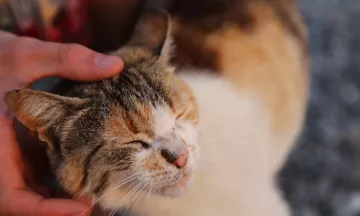A while ago we asked via our Facebook page whether or not you talk to your pet. You responded en-masse with a resounding YES: each and every day, all day long. And what do you chat to your faithful friend about? Anything and everything! What kind of day you've had, what you're doing, and even how you feel. Whilst it might sound odd to those without pets, talking to your moggy or mutt is actually extremely common. But did you know that it's also very healthy?
Your pet knows exactly how you're feeling
Even though we talk to people using words, eighty percent of our communication goes via body language. Pets can recognise a few words, but don't really understand spoken language. They are, however, masters at picking up on our emotions, and are able to sense how we're feeling. Some dogs will lay their head on your lap when you're crying for example, whilst your cat will often sit with you when you're feeling lonely. So, it doesn't really matter what you say, but rather how you say it. If you talk regularly to your pet, he'll get to know you inside out, which in turn strengthens your bond.

Talking to your pet is good for you
It's entirely natural that people enjoy talking to their pets. After all, your pet is a genuine friend, a friend that you can bare your soul to: your secrets are always safe and an animal never judges you. That's why pets play such an important role in the lives of growing children. Children with an autism spectrum disorder in particular, often establish an extremely strong connection with their cat or dog. Pets fulfil an important social function for parents too. And a good old chinwag with your furry friend is also physically good for you: it lowers stress levels and leaves you feeling happier as a result!
Talking is good for your pet
As already mentioned, your pet senses how much you love him by the way that you talk to him. He might not understand what you're actually saying, but he will feel a connection. And you can express a great deal through intonation. A dog associates a high, bright voice with enthusiasm and excitement for example. A neutral, calm voice provides reassurance, whilst a low, angry voice signals disapproval. You can therefore quickly put your pet at ease or enthuse them solely by using the power of your voice. Indeed, those who regularly talk to their pets usually have a closer bond with them.

You learn your pet's patter too!
Although animals are good at picking up on much of what we say, they still speak a different language. If you pay attention though, you'll start to notice that your pet has quite a lot to say for himself! Immerse yourself in the body language of your cat, dog, rabbit or any other pet for that matter, and you'll soon realise that there's a whole new world to discover. And once you understand your pet's patter better, the bond between you will become even stronger.





